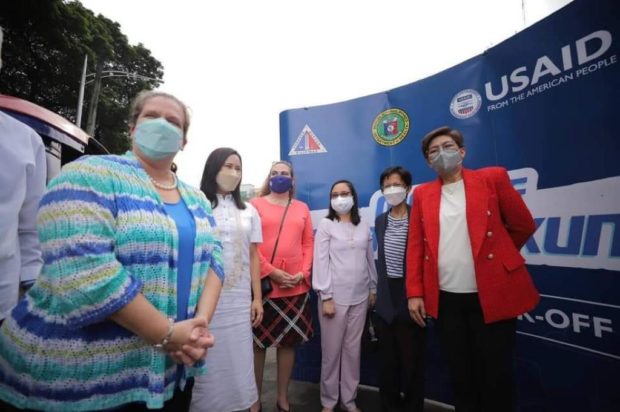
Quezon City Mayor Joy Belmonte (second from left) with Health Undersecretary Maria Rosario Vergeire (extreme right) and US Charge D’Affaires Heather Variava. Contributed photo
MANILA, Philippines — New COVID -19 cases in Quezon City have continued to decline as various interventions laid out by the local government go on high gear.
From the highest 7-day average of 1,181 in September, fresh infections dropped to 204 from October 19-25 to 190 from October 26-November 1, and then to 135 from November 2-8.
OCTA Research noted that Quezon City’s COVID-19 situation greatly improved as it is now classified as “low risk.” Currently, the reproduction number of Quezon City is at 0.50, which is better than the entire National Capital Region or Metro Manila, which is at 0.53. The World Health Organization’s standard COVID-19 reproduction number is at 1.0.
The independent pandemic monitor also said Quezon City’s coronavirus incidence rate or Average Daily Attack Rate (ADAR) is now a moderate 5.97 per 100,000 while hospital COVID-19 bed occupancy is currently at 42 percent while ICU occupancy was at 50 percent.
OCTA Research emphasized that Quezon City’s successful pandemic management greatly helped Metro Manila to also achieve its present low-risk level.
Quezon City Mayor Joy Belmonte said the “population protection“of 1.7 million residents was achieved way ahead of the national government deadlines. The latest numbers indicate that fully vaccinated persons in the city are now at 1,782,868, or 104.87 percent, while those who received the first COVID-19 vaccine dose are at 1,932,777 or 113.69 percent.
The local government has also recently vaccinated 18,096 pediatric individuals against the coronavirus.
Presently, Quezon City holds the national record of 55,000 vaccinations in one day as the local government established 40 vaccination sites that are being selflessly maintained by volunteers as well as public and private sector health workers.
More than 3,500 contact tracers were also hired by the city with the help of the Department of Interior and Local Government (DILG) and the Department of Labor and Employment (DOLE). The local government said this enabled them to reach 31.2 contacts per one COVID-positive individual. The national standard and NCR standard for this is 37 and 9, respectively.
Also, over 42,000 business establishments are now using “KyusiPass,” which is the city’s contact tracing app in partnership with the UP Pandemic response team. Both worked to implement end-to-end MedAlert COVID testing and Contact Tracing platform.
The city government likewise established 12 Hope Community Caring Facilities to increase quarantine capacity for 1,733 coronavirus-positive patients, including family rooms. The food, hygiene kits, and medicines are all free of charge in these facilities while healthcare workers attend to patients on a daily basis. About 86 barangays also opened their respective quarantine areas to isolate infected residents and their total capacity reached 900.
Quezon City also introduced the country’s first granular lockdown, authorized by a city ordinance.
“[S]pecial Concern Lockdown areas, where the LGU thru the barangay, takes care of the essential needs of affected residents,” the local government noted.
Today, it added, “saturation drives continue to flush out communities with still unvaccinated individuals.”
Earlier, DILG Secretary Eduardo Año lauded Mayor Belmonte for doing good in her COVID response program. “Despite having the largest population in NCR, vaccination rate is also very high in Quezon City and that is satisfactory performance,” he added.
The US Embassy, meanwhile, thru the United States Agency for International Development (USAID) also declared support to Quezon City’s COVID-19 response programs and will grant humanitarian and technical assistance to the local government unit’s pandemic efforts. US Charge D’Affaires Heather Variava said that USAID will help in ramping up Quezon City’s ProtekTodo mobile testing and vaccination campaign and employ more health workers to increase its capacity to 5,000.
Belmonte said she remains optimistic about the further decline in the number of new COVID-19 cases in the coming days as her administration intensifies vaccinations in remote barangays.

